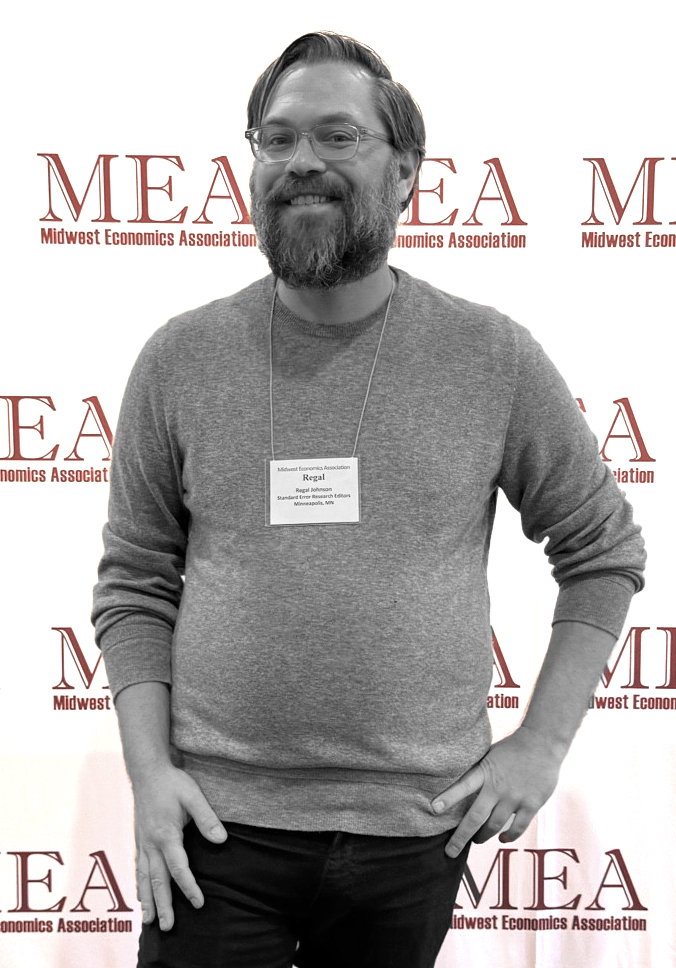Conference report:
Advancing the research frontier in uncertain times
Regal Johnson, who represented Standard Error at this year’s Midwest Economics Association meeting, reports on his encounters with veteran and budding economists who remain committed to bringing research to bear on social problems in chaotic times.

As I listened to Kirabo Jackson offer an impassioned presentation of the best new estimates demonstrating the value of investing in children’s education, I was struck by the theme that had been developing in my conversations with researchers and students since I had arrived at the Midwest Economics Association’s 89th annual meeting the previous morning. Attendees were heartened that, amid the chaos in the world, passionate people were identifying problems and bringing their research talents to bear to find solutions. I had felt the same, and I was particularly impressed by the new crop of outstanding scholars on their way to promising careers.
Attendees were heartened that, amid the chaos in the world, passionate people were identifying problems and bringing their research talents to bear to find solutions.
Undergraduate students of Kristine West of St. Catherine’s University in St. Paul, Minnesota, had presented earlier in the day on school stop and start times and their impact on maternal employment. These remarkable young researchers fielded questions from participants and the discussant, PhD candidate Manisha Kapoor of UC Riverside, with the skill of veteran attendees. When I spoke with them after the session, I was impressed by their confidence and buoyed by their enthusiasm for research and policy.
Kapoor’s own research on the ending of late-night work restrictions for women in India provided insights into not only women’s labor force participation but also their safety in their interactions with both strangers and intimate partners. In the same session on gender and the labor market, Seonyoung Park of Colgate presented her work on why married mothers in the US work more, examining historical trends and using a model to understand the mechanisms driving fertility and labor decisions, specifically the declining gender wage gap and increasing wage uncertainty. In a later session on gender and sexual orientation, the Minneapolis Fed’s Mallika Thomas discussed her research on the impact of mandatory maternity benefits in the United States on women’s labor supply, wages, and employment. She sought to determine whether and how the burdens of this kind of policy were internalized by the target group. As more women step into the workforce across the world, addressing these sorts of questions will become all the more important. At Standard Error, we will be eager to continue to support researchers working to address these difficult issues.
The intriguing new findings presented at MEA 2025 were not limited to questions of labor and gender. The pressing question of substance use received strong attention and yielded fascinating initial results. Mary Burke, of the Boston Fed, and her colleagues used novel datasets to examine how the Medicaid expansion affected prescription of buprenorphine, one of only three FDA-approved medications to treat opioid addiction. They employed all-payer claims data from Rhode Island to identify first-time buprenorphine prescriptions. Rene Saran and Sachin Sisodiya (both from the University of Cincinnati) assessed the possible impacts of informational nudges in the context of prescription pain-reliever use and misuse. Rowan University’s Yupeng Li reported on work examining substance use disorder (SUD) emergency room admissions before and during COVID-19 in southern New Jersey and whether the pandemic worsened disparities in SUD ER use across races and ages. Keshar M. Ghimire of the University of Cincinnati used the rapid relaxation of sports betting laws across the US and the Centers for Disease Control’s (CDC’s) Behavioral Risk Factor Surveillance System to examine whether the well-documented connection between gambling and substance use is causal or both are driven by shared underlying causes.
Here at Standard Error, we know that staying abreast of new developments in the field is vital to our success in helping researchers succeed.
Beyond the direct labor and workforce questions presented on earlier, researchers also addressed issues of gender and equality in a variety of ways. Illinois State University’s Ruby Morr followed the thread of existing research that identified an earnings and benefits penalty suffered by LGBTQ people and used a linear probability model to examine whether they face an additional effect on health insurance coverage. Thomas Helgerman (University of Minnesota) discussed his work with Benjamin Pyle (Boston University) on whether the implementation of the Vietnam War draft in the US could explain the increase in the number of women in law schools. In the context of the startling growth in violence against women in India, Devika Hazra of Cal State LA spoke about her work on the impact of the staggered introduction of a 9-1-1-like system across the country’s states. She examined the consequences for crimes against women, suicide related to sexual abuse or dowries, and secondary effects such as indictments for related crimes.
In a country that struggles with uniquely high rates of incarceration and gun violence, it was inspiring to see researchers hard at work on these issues as well. Logan Lee of Grinnell spoke about his own experiences teaching in prisons and explained his research with Romaine Campbell of Cornell seeking to address the evidence on prison education and its causal effects on recidivism. Rhet Smith (UT El Paso) presented his work with colleagues Cameron Ellis and J. Bradley Karl (University of Iowa and Florida State) on firearm prevalence and gun crime. In this notoriously difficult research area, they adopted a novel approach: The legalization of medical cannabis created something of a stealth ban on gun ownership. The Brady Bill prevents people using marijuana from owning a gun, so people in legalizing states face a choice between the two. Learning about such innovative approaches to investigating difficult problems was fascinating, and here at Standard Error, we know that staying abreast of new developments in the field is vital to our success in helping researchers succeed.
I speak for the whole team at Standard Error in thanking these scholars for their remarkable work and congratulating them and the entire MEA team for a fascinating and enlightening weekend in Kansas City. I look forward to seeing what new developments will be presented next year.


